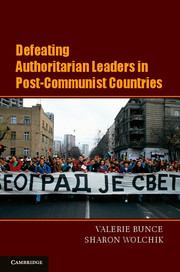Book contents
- Frontmatter
- Contents
- List of Figures and Tables
- Acknowledgments
- PART I THE PUZZLE
- PART II CASE STUDIES
- PART III COMPARATIVE ANALYSES
- 8 Explaining Divergent Electoral Outcomes
- 9 The Electoral Model
- 10 The Cross-National Diffusion of Democratizing Elections
- 11 After the Elections
- 12 Conclusions
- Appendix
- Index
9 - The Electoral Model
Evolution and Elements
Published online by Cambridge University Press: 05 June 2012
- Frontmatter
- Contents
- List of Figures and Tables
- Acknowledgments
- PART I THE PUZZLE
- PART II CASE STUDIES
- PART III COMPARATIVE ANALYSES
- 8 Explaining Divergent Electoral Outcomes
- 9 The Electoral Model
- 10 The Cross-National Diffusion of Democratizing Elections
- 11 After the Elections
- 12 Conclusions
- Appendix
- Index
Summary
Politics is the art of getting people to vote for you. It's applicable all over the world. If it wasn't, I wouldn't have a job.
David Dettman, political consultant who worked on party development in Ukraine and then in Baghdad, Tikrit, and Hilla, IraqThe citizen is not a constant political actor.
Gabriel Almond and Sidney VerbaIn the previous chapter, we compared our eleven elections in order to assess a series of hypotheses about why oppositions in mixed regimes would succeed or fail in their quest to win power. We concluded that the vulnerability of the regime on the eve of the elections was less helpful in explaining electoral results than what happened during the elections. In particular, the key distinction that emerged was whether oppositions and their allies ran ambitious or modest political campaigns. Thus, oppositions won when they took such innovative actions as forming collaborative ties with each other; running creative, nationwide campaigns; carrying out significant voter registration and turnout drives; and making use, where possible, of international and domestic vote monitoring, professional exit polls, and parallel vote tabulation. While the oppositions in Slovakia, Croatia, Serbia, Georgia, and Ukraine used these and other innovative strategies when they ran for office, their counterparts in Armenia, Azerbaijan, and Belarus took only a few of these crucial steps – for example, forming in every case an opposition bloc.
- Type
- Chapter
- Information
- Defeating Authoritarian Leaders in Postcommunist Countries , pp. 247 - 277Publisher: Cambridge University PressPrint publication year: 2011

